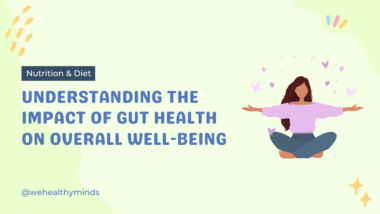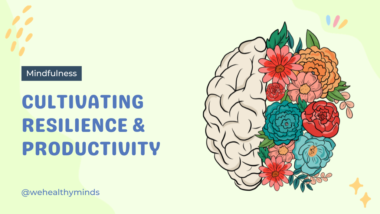Mindfulness, once regarded as a niche practice, has now firmly established itself as a subject of scientific inquiry. Researchers have been delving into the science of mindfulness to understand its profound effects on mental health and emotional resilience. In this blog, we will explore the science behind mindfulness practices, their impact on mental health, and how it contributes to emotional resilience, all in the context of enhancing overall well-being.
Delve into the profound realm of the science of mindfulness, unraveling its profound impact on mental health and emotional resilience, illuminating the transformative power of self-awareness and inner balance.
wehealthyminds
Start your journey towards enhanced mental well-being and emotional strength. Explore the science of mindfulness and discover how it can positively impact your life. Begin your transformation today!

The Science of Mindfulness
The science of mindfulness is a multi-faceted field that encompasses a broad spectrum of research areas. It involves understanding the neurological, psychological, and physiological changes that occur during mindfulness practices. These practices, including meditation and deep breathing, have been subject to extensive studies that reveal their potential to rewire the brain and improve mental health.
Mental Health Benefits
Mindfulness practices have shown remarkable benefits for mental health. Studies have consistently demonstrated that regular mindfulness practice can reduce symptoms of anxiety and depression. By fostering self-awareness and emotional regulation, mindfulness techniques empower individuals to gain control over their mental states.
Mindfulness practices help individuals confront and manage the challenges of daily life. The practice of focusing on the present moment and acknowledging thoughts and feelings without judgment can alleviate stress and prevent the onset of stress-related disorders. It is particularly effective for individuals experiencing chronic stress or those looking for tools to enhance their emotional resilience.
Emotional Resilience
Emotional resilience is the capacity to bounce back from life’s adversities and cope with stressors effectively. The science of mindfulness reveals that mindfulness techniques, such as meditation and mindful breathing, can significantly enhance emotional resilience.
Mindfulness equips individuals with the skills to face emotional challenges with grace and composure. It provides a mental toolkit for managing difficult emotions, helping individuals navigate through life’s ups and downs. By practicing mindfulness, one can develop greater self-awareness and emotional regulation, which in turn fosters emotional resilience.
Mindfulness Practices
Mindfulness practices, which are at the core of this science, encompass a variety of techniques. Meditation is one of the most well-known mindfulness practices. It involves sitting comfortably and focusing one’s attention on the present moment. Through meditation, individuals can cultivate concentration, awareness, and a deeper understanding of their thought patterns.
Mindful breathing is another fundamental technique that involves focusing on the breath. It is a simple yet powerful practice that helps individuals center themselves in the present moment, reducing anxiety and stress. Regular practice can lead to increased emotional resilience.
Research-Based Insights
The science of mindfulness relies on research-based insights to understand its impact on mental health and emotional resilience. Studies have shown that mindfulness practices can lead to structural changes in the brain, particularly in areas associated with self-awareness, compassion, and emotional regulation.
Neuroimaging studies have illustrated how mindfulness can enhance the connectivity of various brain regions. This enhanced connectivity is often associated with improved cognitive functions and emotional well-being.
Furthermore, research has linked mindfulness practices to increased gray matter in the brain. This can enhance an individual’s ability to cope with stress, regulate emotions, and adapt to challenges effectively.
Enhancing Overall Well-Being
The ultimate goal of mindfulness practices is to enhance overall well-being. By cultivating emotional resilience and improving mental health, mindfulness empowers individuals to live more fulfilling and balanced lives.
The science of mindfulness continues to unravel its potential for promoting well-being. From improved mental health to greater emotional resilience, the benefits are profound and far-reaching. Mindfulness techniques provide individuals with practical tools to navigate the complexities of life with grace and equanimity.
Conclusion
The science of mindfulness has shed light on its remarkable impact on mental health, emotional resilience, and overall well-being. Mindfulness practices are not just meditative techniques; they are rooted in research-based insights that provide a deeper understanding of their transformative effects.
By delving into the science of mindfulness, individuals can embrace these practices with greater confidence, knowing that they are supported by substantial evidence. The positive impact on mental health and emotional resilience contributes to a more balanced, fulfilling, and emotionally resilient life.
In conclusion, mindfulness practices are not mere trends; they are scientifically validated tools for enhancing well-being. As the science of mindfulness continues to evolve, individuals are increasingly empowered to take control of their mental health and emotional resilience, ultimately leading to a life of greater overall well-being.







